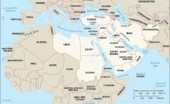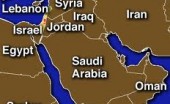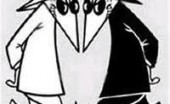Molly Minturn - My family is heartbroken to share that my father died in surgery on Monday, Feb. 10. It…
Wednesday Night #1297
Written by Diana Thebaud Nicholson // January 10, 2007 // China, Environment & Energy, Geopolitics, Herb Bercovitz, Justice & Law, Middle East & Arab World, Politics, Reports, U.S., Wednesday Nights // 1 Comment
10 January 2007
We are still basking in the reflected glory of last week’s stimulating discussion on the economy, innovation and related topics.
Not quite sure what we will do for an encore, however George W. Bush (now there’s an unlikely Wednesday Nighter) has stepped into the breach and will provide fodder to all the political scientists, military analysts and the rest of us keen observers with his speech [see item from Jim Heffernan on http://www.wednesday-night.com/ ] on the new Iraq strategy which is expected to call for an increase of more than 20,000 troops.
As we waited with ‘baited” breath as our children used to write, we have nonetheless found other newsworthy items for your delectation.
From Canada’s Peter MacKay in Afghanistan, no promises of troops , but, oh yes, there’s the new Harper Cabinet and the fallout from the defection of Wajid Khan from the Liberals.
For a little local political content, we have the possible candidacy of Justin Trudeau in Outremont, not to mention the on-going battle for Park Avenue , spear-headed by our friend Marie Griffiths of CKDG 105.1 FM and whose cause will be eloquently voiced by our OWN Julius Grey.
Following on pre-session discussions with André Saumier last week, we have been interested in a major piece from the Wall Street Journal China Cashes In on Global Warming. Its conclusion: China is turning its environmental problems into a shrewdly managed financial asset, capitalizing on corporate and governmental efforts to curb global warming. How much China’s actions will do for the atmosphere remains an open question.
Unfortunately, the article is only available to subscribers, but we can forward the text to any who are interested.
Meanwhile. President Bush has struck another blow for free enterprise with the announcement that he has lifted a ban on oil and gas drilling in an Alaska’s Bristol Bay, home to endangered whales.
While the mild winter in many parts of Europe and the northeast U.S. has dulled our sensitivity to oil prices , Russia’s move to halt supplies to Belarus serves as a reminder that we should be paying more attention to events in Nigeria and we warmly (no pun intended) recommend “Blood oil” in this month’s Vanity Fair.
The situation in Burma is one which we too rarely mention, likely because it changes so little. This week, however, we draw your attention to the draft resolution the U.S. has circulated to the UN Security Council, calling on Burma to ease repression and free opposition leader Aung San Suu Kyi. She has been under house arrest for almost 17 years, despite having been overwhelmingly endorsed in the elections of 1990.
In rather sombre conclusion to this brief tour of the week’s events, we offer the following from Foreign Policy for you to ponder: “Why are hawks so influential? The answer may lie deep in the human mind. People have dozens of decision-making biases, and almost all favor conflict rather than concession. A look at why the tough guys win more than they should.”
Adding to the element of psychiatry introduced above, we may also look at the class action lawsuit that Janine Huard is attempting to launch to claim compensation for her suffering under the programme of mind-control experiments conducted at the Allan Memorial Institute on behalf of the CIA (MK-Ultra) under the direction of Dr. Ewan Cameron. Of course, the federal court hearing is scheduled to begin Wednesday.
The Report
The President’s speech
At times, politicians seem to be elected more through their appearance and charm than their politics. Others appear to have the good fortune of having been elected without having gained a clear majority of votes cast. At all times, the ability to rally the electorate around a popular issue virtually guarantees success as was evident in Canada in the era of Pierre Trudeau. It might be argued that it does not apply to President Bush as the Constitution limits his presidency to two terms, with a new President to be sworn in two years from now. The Republican Party, however, having continuously lost popular support during this presidential term, surely hopes to regain ascendancy as well as the presidency. This is the reaction expressed by Wednesday Nighters to the President’s cleverly crafted speech explaining his exit strategy in Iraq. The obviously unemotional, uninspired, prompter-read delivery appeared to set the stage for a less than heroic departure from Iraq. For the first time, the words American defeat were slipped into the text.The enigma of his grouping Jordan with Saudi and Egypt may be interpreted as a call to secular Muslim Middle East countries to join in the struggle to put an end to the internecine battle in Iraq.
Park Avenue/ Robert Bourassa Avenue
Mayor Tremblay’s insistence on renaming Park Avenue and Bleury over the vociferous objections of Montrealers appears to some as being typical of his apparent dictatorial style. Pre-election polls did not favour Tremblay as Mayor, but he is said to have won by default in the absence of more popular and/or competent candidates. During his term of offices he has broken many promises, among them, that he would not become involved in merger activities and that taxes would not rise. However, his determination to change street names has been evident, as well, in the minds of his predecessors. Whatever the merit of honouring the memory of recently departed citizens, the current names are historic, reflecting the history of the city we call home. The families of the citizens so honoured should take little comfort from the fact that there exists a probability that at some future date their current hero will ultimately face the fate of being replaced by a more recent candidate. Certainly great cities such as London and Paris have not chosen to change street names. Streets and addresses in nineteenth century history and novels set there still exist and can be located.
Dr. Ewan Cameron’s experiments
The debate rages over the intent, whether evil or benign of Dr. Ewan Cameron and his experiments in the 1940’s at the Allan Memorial Institute of the Royal Victoria Hospital, using psychic driving and L.S.D. in research funded by the C.I.A. It is probable that the source of the funding- of which he very well might not have even been aware -, as well as his sudden unannounced departure from his post and the city has placed a shadow on his motivation, but the context of the era in which he operated and the fact that the majority of the psychotic patients whom he treated had previously undergone unsuccessful treatment elsewhere should be taken into consideration.
The experimental treatment which indeed enjoyed some measure of success, was performed by Dr. Cameron principally, if not solely, on psychotic patients for whom treatment had been, at that time, very crude electroshock therapy and confinement.His hope was that by bringing them back to an earlier stage in their lives, he could then slowly return them to the present minus the psychosis.. Indeed, he is reported to have succeeded in achieving this with many of his patients.
The vast majority of pre-World-War II medicines were woefully ineffective except for their placebo effect. The discovery of sulfonamides and penicillin, stimulated an interest in finding new methods of treating intractable illnesses in all areas of medicine. The first use of the first phenothiazines (Largactil) by Doctor Heinz Lehman may very well have been the beginning of hope in the treatment of psychoses and one of the incentives for Dr. Cameron. In this climate, it is very difficult to assert that Doctor Cameron’s motives have been totally benign, but it seems reasonable to assume that the severity of the bad press he has been receiving is unwarranted.
QUOTES of the EVENING
… fairly good speech considering the person it came from, one of his better ones. One expression never heard from him before, ‘American defeat’… rather encouraged by it. You can’t graft onto Iraq, the democratic principles America hold so dear
In American fashion, it’s just the last hurrah – getting people prepared for the last hurrah … not the Americans’ fault, it’s the Iraqis’ fault
I have to try to understand the battle of the mind. It will go on and on until human beings stop being human beings and if we don’t understand it, it we will be in big trouble
To apply today’s sensibilities to things that happened fifty years ago is not right




One Comment on "Wednesday Night #1297"
Five Flaws in the President’s Plan
By Zbigniew Brzezinski
January 12, 2007
The president’s speech gives rise to five broad observations:
· It provided a more realistic analysis of the situation in Iraq than any previous presidential statement. It acknowledged failure, though it dodged accountability for that failure by the standard device of assuming personal responsibility. Its language was less Islamophobic than has been customary with President Bush’s rhetoric since Sept. 11, though the president still could not resist the temptation to engage in a demagogic oversimplification of the challenge the United States faces in Iraq, calling it a struggle to safeguard “a young democracy” against extremists and an effort to protect American society from terrorists. Both propositions are more than dubious.
· The commitment of 21,500 more troops is a political gimmick of limited tactical significance and of no strategic benefit. It is insufficient to win the war militarily. It will engage U.S. forces in bloody street fighting that will not resolve with finality the ongoing turmoil and the sectarian and ethnic strife, not to mention the anti-American insurgency.
· The decision to escalate the level of the U.S. military involvement while imposing “benchmarks” on the “sovereign” Iraqi regime, and to emphasize the external threat posed by Syria and Iran, leaves the administration with two options once it becomes clear — as it almost certainly will — that the benchmarks are not being met. One option is to adopt the policy of “blame and run”: i.e., to withdraw because the Iraqi government failed to deliver. That would not provide a remedy for the dubious “falling dominoes” scenario, which the president so often has outlined as the inevitable, horrific consequence of U.S. withdrawal. The other alternative, perhaps already lurking in the back of Bush’s mind, is to widen the conflict by taking military action against Syria or Iran. It is a safe bet that some of the neocons around the president and outside the White House will be pushing for that. Others, such as Sen. Joseph Lieberman, may also favor it.
· The speech did not explore even the possibility of developing a framework for an eventual political solution. The search for a political solution would require a serious dialogue about a joint American-Iraqi decision regarding the eventual date of a U.S. withdrawal with all genuine Iraqi political leaders who command respect and wield physical power. The majority of the Iraqi people, opinion polls show, favor such a withdrawal within a relatively short period. A jointly set date would facilitate an effort to engage all of Iraq’s neighbors in a serious discussion about regional security and stability. The U.S. refusal to explore the possibility of talks with Iran and Syria is a policy of self-ostracism that fits well into the administration’s diplomatic style of relying on sloganeering as a substitute for strategizing.
· The speech reflects a profound misunderstanding of our era. America is acting like a colonial power in Iraq. But the age of colonialism is over. Waging a colonial war in the post-colonial age is self-defeating. That is the fatal flaw of Bush’s policy.